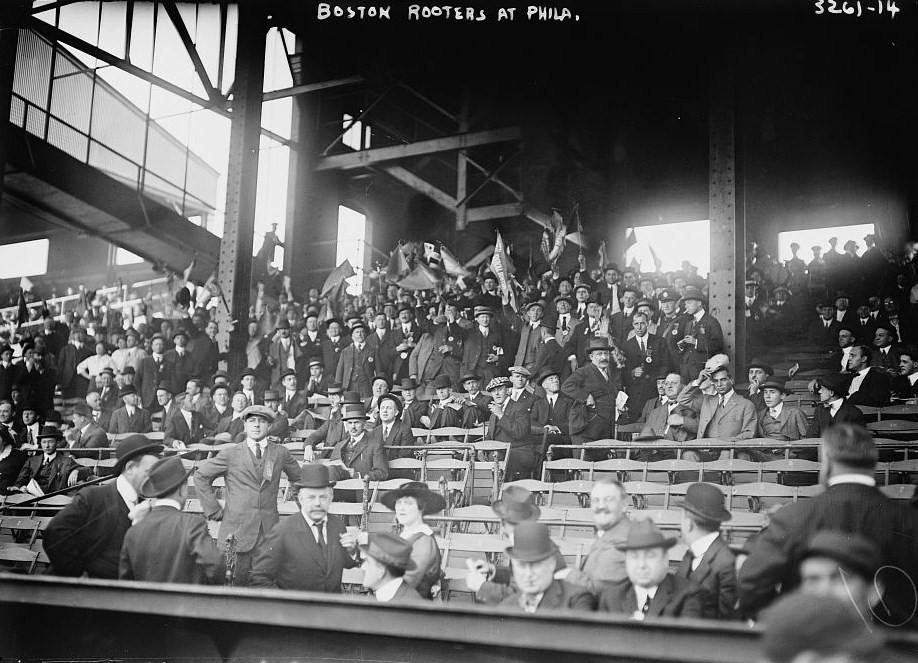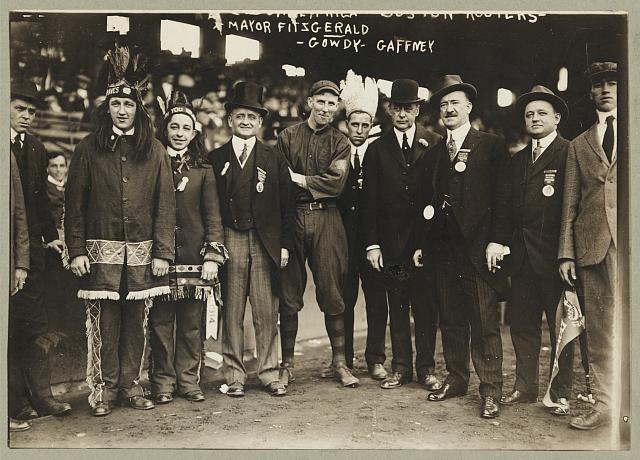Forget 2014: The 1914 World Series Went Well for Boston

Boston’s ‘Royal Rooters’ cheer on the Braves in Philadelphia in 1914. Via Wikimedia Commons
Perhaps you’re feeling the need for a little baseball escapism this October. We invite you to rewind 100 years to October 1914, a playoff season that was in nearly every way the opposite of this one.
Forget our 2014 decline from returning champions to league losers. This 1914 season was the first year that a Boston team so dramatically journeyed “from worst to first.” Forget our non-appearance in the playoffs. This was the first year any major league baseball team swept the World Series in four games. Forget, even, the Red Sox. This was the year that Boston went nuts for its National League team, the Boston Braves.
Earlier in the season, the Braves hadn’t shown much potential to capture Boston’s hearts. The club was in last place as late as July 4. Then they started to climb, and by the end of the season, they had won the National League by and a half games. The momentum carried through to the World Series against the consistently strong Philadelphia Athletics. The Braves won the first two games at Philadelphia’s Shibe Park. Then the series came back to Boston, where the team was renting Fenway Park (pictured above during from the Red Sox during construction of Braves Field. (The team, of course, moved to Milwaukee in 1953, and Braves Field now makes up part of the Nickerson Field sports complex.) At Fenway, they won Game Three in 12 innings. They won Game Four, too, making Major League history as the first team to sweep a series.
As you’ll recall from last year’s “worst to first” season, comeback stories tend to get everyone pretty excited. Boston’s politicians made for particularly memorable fans. Here’s a photo of John Francis Fitzgerald, former mayor of Boston and grandfather of a future president, standing with Braves player Hank Gowdy and some very awkwardly dressed “Braves,” with whom you would be hard pressed to find a Kennedy willing to be photographed today.
Kennedy marched at the head of the Royal Rooters, a sort of cheer squad that went to games those days. Not to be outdone, Kennedy’s rival, then-Mayor James Michael Curley, cut a memorable figure after Game Four. As baseball writer Robert Creamer described it:
Mayor Curley [made] a speech from the roof of the dugout and introducing each of the Braves’ players as they came out to greet the crowd. After the players had gone back into the clubhouse, Curley stayed on the dugout roof for half an hour, leading the crowd in song. That night, he was host at a formal dinner honoring the team. The guest list included the governor of Massachusetts, Cardinal O’Connell of Boston and a diplomat from Peru.
There was, of course, feverish excitement in the air that night, and perhaps Curley and Kennedy caught it. But then, as Creamer slyly noted, there might have been a calculated angle to their enthusiasm. “Of course, it was an election year,” he wrote.



